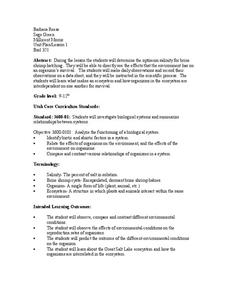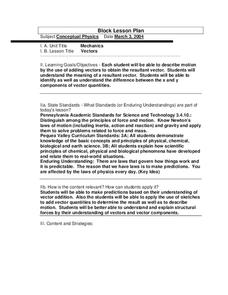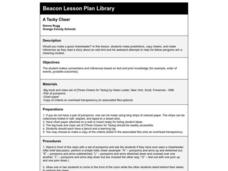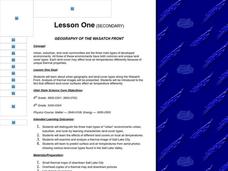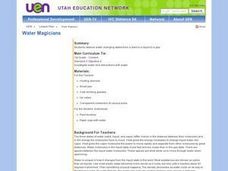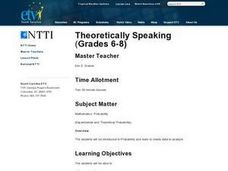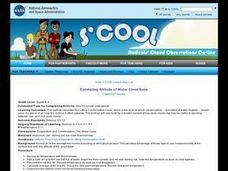Curated OER
Nature of Meteor Showers
Ninth graders describe, in general terms, the distribution of matter in space and
identify evidence for, and describe characteristics of, bodies that make up the solar system. They then investigate predictions about the motion,...
Curated OER
Brine Shrimp Feeding
Third graders study the diet of the brine shrimp. This is an introduction to a math measurement of a micrometer because of the size of the food brine shrimp feed upon. They make predictions about the types of food shrimp eat based on...
Curated OER
Hatching Brine Shrimp
Third graders investigate the environment that is considered favorable for brine shrimp hatching. The salinity level is of particular interest in the observations because the optimum level is needed for survival. They make daily...
Curated OER
Kissing Coyotes
Fourth graders are read the book "Kissing Coyotes". During the story, they make predictions about what they believe might happen next. After the story, they create their own story using their imagination and draw illustrations.
Curated OER
Vectors
Learners describe motion by the use of adding vectors. They identify the difference between the x and y components of vector quantities. Students are given the Paper Bridge Building handout and the instructions as to where to perform...
Curated OER
A Tacky Cheer
Second graders make predictions, copy cheers, and make inferences as they read a story about an odd bird and his awkward attempts to help his fellow penguins win a cheering contest.
Curated OER
Efficiency Means Getting More for Less
Students measure water and make predictions about efficiency.
Curated OER
Geography of the Wasatch Front
Learners examine and discuss urban geography and land-cover types along the Wasatch Front. They analyze thermal images, create collages, and predict surface and air temperatures from aerial photos in the Salt Lake City Valley.
Curated OER
Geography of the Wasatch Front
Students identify the three main types of urban environments by learning characteristic land-cover types. They examine and analyze a thermal image of Salt Lake City. Then they predict surface and air temperatures from aerial photos.
Curated OER
Meteorologist for a Day
Students research weather patterns, predict the weather for a US city and write a weather forecast that be presented to the class. The forecast should explain their weather prediction and the weather patterns and conditions it is based on.
Curated OER
Mathematics: Best Salary
Sixth graders pretend to need jobs to earn money for a go-cart which costs $1,000. They predict which of two scenarios raise the money first. they construct charts and graphs to demonstrate their predictions.
Curated OER
Water Magicians
First graders observe water changing states from a solid to a liquid to a gas. They predict what they think happen to ice cubes as they sit out. They paint water with paintbrushes outside the classroom in the sun and watch the water...
Curated OER
Fertilizer Frenzy
Pupils design and conduct an experiment testing the effect of fertilizers/soaps on algal growth. They estimate and predict, identify the variables, formulate a hypothesis, and record and analyze the data, presenting their findings in a...
Curated OER
Rollin' On
Third graders investigate the effects of gravity on the motion of a marble on an inclined plane and a declined plane. They work in small cooperative groups to predict and explain outcomes.
Curated OER
Tony's Spelling Troubles
Students are introduced to the given problem and describe in their own words the situation represented in a bar chart and tally chart. They then use a bar chart and tally chart to make sensible predictions.
Curated OER
Make the Highest Total
Sixth graders predict the outcome of a simple probability experiment, test it and explain the result by using problem solving strategies to explore situations mathematically. They then play a few games informally where students play in...
Curated OER
What's In the Dirt?
Third graders watch a demonstration and write in their journals their predictions about how time might affect the moisture in the two paper towels. Using a Berlese funnel, they record their observations when it comes the amount of...
Curated OER
Determination of Phosphates
Students engage in a laboratory lesson in order to increase understanding of the impact of phosphates at the chemical and ecological levels. The lab exercise is completed with the goal of getting them to predict the outcomes and future...
Curated OER
Theoretically Speaking
Students define probability. They determine outcome from a given situation based on simple probability. Students create experimental data using a coin and a number cube. They write how theoretical and experimental probability are different.
Curated OER
Forces Applied to an Object
Fourth graders predict, observe, and compare what happens when a force is applied to an object. In this forces lesson plan, 4th graders complete a 'swinging hammer' activity to learn about forces and motion.
Curated OER
Density
Ninth graders predict when an object will sink or float based on comparison of the density of the object to the density of the substance in which it is placed.
Curated OER
A Magnetic Personality
Fifth graders experiment to discover how many paper clips different types of magnets can pick up. They make predictions, carry out the experiment and collate the data.
Curated OER
Estimating Altitude of Water Cloud Base
Young scholars conduct an experiment to determine dew point and use a formula to detemine altitude. They construct a chart and predict what altitude clouds would form, given the dew point on the ground.
Curated OER
How much room?
Students examine the amount of usable space that exists in their classroom using square meters and square centimeters. They apply the information to predict the ideal size of a classroom.
Other popular searches
- Predicting Outcomes
- Reading Predicting Outcomes
- Predicting Outcomes Math
- Predicting Outcomes in Reading
- Ged Predicting Outcomes
- Predicting Outcomes in Stories




